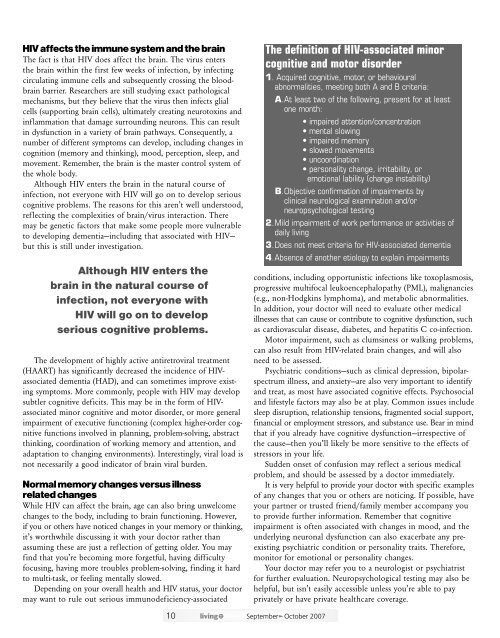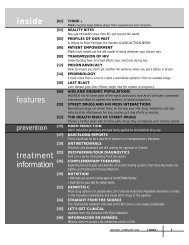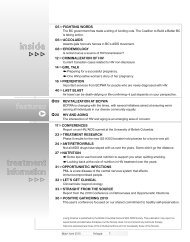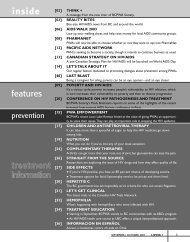iv poz mag.qxd - Positive Living BC
iv poz mag.qxd - Positive Living BC
iv poz mag.qxd - Positive Living BC
You also want an ePaper? Increase the reach of your titles
YUMPU automatically turns print PDFs into web optimized ePapers that Google loves.
issue 50.<strong>qxd</strong>:l<strong>iv</strong> <strong>poz</strong> <strong>mag</strong>.<strong>qxd</strong> 9/3/07 4:04 PM Page 10<br />
HIV affects the immune system and the brain<br />
The fact is that HIV does affect the brain. The virus enters<br />
the brain within the first few weeks of infection, by infecting<br />
circulating immune cells and subsequently crossing the bloodbrain<br />
barrier. Researchers are still studying exact pathological<br />
mechanisms, but they believe that the virus then infects glial<br />
cells (supporting brain cells), ultimately creating neurotoxins and<br />
inflammation that da<strong>mag</strong>e surrounding neurons. This can result<br />
in dysfunction in a variety of brain pathways. Consequently, a<br />
number of different symptoms can develop, including changes in<br />
cognition (memory and thinking), mood, perception, sleep, and<br />
movement. Remember, the brain is the master control system of<br />
the whole body.<br />
Although HIV enters the brain in the natural course of<br />
infection, not everyone with HIV will go on to develop serious<br />
cognit<strong>iv</strong>e problems. The reasons for this aren’t well understood,<br />
reflecting the complexities of brain/virus interaction. There<br />
may be genetic factors that make some people more vulnerable<br />
to developing dementia—including that associated with HIV—<br />
but this is still under investigation.<br />
Although HIV enters the<br />
brain in the natural course of<br />
infection, not everyone with<br />
HIV will go on to develop<br />
serious cognit<strong>iv</strong>e problems.<br />
The development of highly act<strong>iv</strong>e antiretroviral treatment<br />
(HAART) has significantly decreased the incidence of HIVassociated<br />
dementia (HAD), and can sometimes improve existing<br />
symptoms. More commonly, people with HIV may develop<br />
subtler cognit<strong>iv</strong>e deficits. This may be in the form of HIVassociated<br />
minor cognit<strong>iv</strong>e and motor disorder, or more general<br />
impairment of execut<strong>iv</strong>e functioning (complex higher-order cognit<strong>iv</strong>e<br />
functions involved in planning, problem-solving, abstract<br />
thinking, coordination of working memory and attention, and<br />
adaptation to changing environments). Interestingly, viral load is<br />
not necessarily a good indicator of brain viral burden.<br />
Normal memory changes versus illness<br />
related changes<br />
While HIV can affect the brain, age can also bring unwelcome<br />
changes to the body, including to brain functioning. However,<br />
if you or others have noticed changes in your memory or thinking,<br />
it’s worthwhile discussing it with your doctor rather than<br />
assuming these are just a reflection of getting older. You may<br />
find that you’re becoming more forgetful, having difficulty<br />
focusing, having more troubles problem-solving, finding it hard<br />
to multi-task, or feeling mentally slowed.<br />
Depending on your overall health and HIV status, your doctor<br />
may want to rule out serious immunodeficiency-associated<br />
The definition of HIV-associated minor<br />
cognit<strong>iv</strong>e and motor disorder<br />
1. Acquired cognit<strong>iv</strong>e, motor, or behavioural<br />
abnormalities, meeting both A and B criteria:<br />
A.At least two of the following, present for at least<br />
one month:<br />
• impaired attention/concentration<br />
• mental slowing<br />
• impaired memory<br />
• slowed movements<br />
• uncoordination<br />
• personality change, irritability, or<br />
emotional lability (change instability)<br />
B.Object<strong>iv</strong>e confirmation of impairments by<br />
clinical neurological examination and/or<br />
neuropsychological testing<br />
2.Mild impairment of work performance or act<strong>iv</strong>ities of<br />
daily l<strong>iv</strong>ing<br />
3.Does not meet criteria for HIV-associated dementia<br />
4.Absence of another etiology to explain impairments<br />
conditions, including opportunistic infections like toxoplasmosis,<br />
progress<strong>iv</strong>e multifocal leukoencephalopathy (PML), malignancies<br />
(e.g., non-Hodgkins lymphoma), and metabolic abnormalities.<br />
In addition, your doctor will need to evaluate other medical<br />
illnesses that can cause or contribute to cognit<strong>iv</strong>e dysfunction, such<br />
as cardiovascular disease, diabetes, and hepatitis C co-infection.<br />
Motor impairment, such as clumsiness or walking problems,<br />
can also result from HIV-related brain changes, and will also<br />
need to be assessed.<br />
Psychiatric conditions—such as clinical depression, bipolarspectrum<br />
illness, and anxiety—are also very important to identify<br />
and treat, as most have associated cognit<strong>iv</strong>e effects. Psychosocial<br />
and lifestyle factors may also be at play. Common issues include<br />
sleep disruption, relationship tensions, fragmented social support,<br />
financial or employment stressors, and substance use. Bear in mind<br />
that if you already have cognit<strong>iv</strong>e dysfunction—irrespect<strong>iv</strong>e of<br />
the cause—then you’ll likely be more sensit<strong>iv</strong>e to the effects of<br />
stressors in your life.<br />
Sudden onset of confusion may reflect a serious medical<br />
problem, and should be assessed by a doctor immediately.<br />
It is very helpful to provide your doctor with specific examples<br />
of any changes that you or others are noticing. If possible, have<br />
your partner or trusted friend/family member accompany you<br />
to provide further information. Remember that cognit<strong>iv</strong>e<br />
impairment is often associated with changes in mood, and the<br />
underlying neuronal dysfunction can also exacerbate any preexisting<br />
psychiatric condition or personality traits. Therefore,<br />
monitor for emotional or personality changes.<br />
Your doctor may refer you to a neurologist or psychiatrist<br />
for further evaluation. Neuropsychological testing may also be<br />
helpful, but isn’t easily accessible unless you’re able to pay<br />
pr<strong>iv</strong>ately or have pr<strong>iv</strong>ate healthcare coverage.<br />
10 l<strong>iv</strong>ing5 SeptemberqOctober 2007











